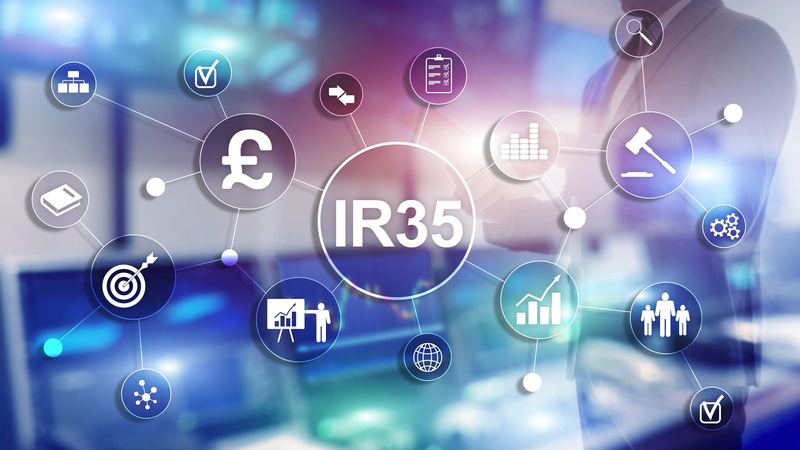Understanding the supply chain, where you sit within it, and what your responsibilities are, is crucial to understand from 6 April 2020.
The reason for this is due to the changes coming into effect from 6 April 2020. These changes see the measures put in place across the Public Sector in 2017 being extended to the Private Sector.
In simple terms IR35 is an area of legislation to ensure workers and employers pay the right amount of tax. The aim is to remove differences between workers and employees who effectively do the same work.
It affects those workers operating through Limited Companies often referred to as Personal Services Companies (PSC) or LLP’s. It is important to note sole traders do not fall under IR35, but they are subject to very similar tests, to ensure they are taxed correctly.
Employees and workers operating through a PSC pay tax very differently, whilst employees pay NIC and Income Tax via Pay As you Earn, and the Employer pays NIC also, a PSC pays corporation tax and can manage how they extract profits, often by lower rates of dividend tax and a minimal salary attracting no Income Tax or NIC. They could also allow profits to roll up to extract these in the future.
The IR35 legislation is therefore in place to determine if the relationship between the worker, and the end client, would be seen as an employer/employee relationship, if the PSC wasn’t there.
If a PSC is found to fall within IR35 then the income received will be taxed as if the worker undertaking the services was an employee, often referred to as a deemed employee. What is important to also note here is whilst the worker would be taxed like an employee, they do not have rights and benefits like an employee, hence why they are referred to as a ‘deemed employee’.
What is also important to note is that the changes coming in from April 2020 are not a change to the factors that are applied to determine whether someone falls inside or outside of IR35, but they shift the responsibility of who must determine the position.
Currently the responsibility lies wholly with the PSC, to ensure the IR35 rules are reviewed and to determine whether they fall inside or outside of IR35 and apply the correct amount of tax.
From 6 April 2020 it will be the responsibility of the organisation receiving the workers service (the client) to determine whether the IR35 rules apply, if they are a large or medium organisation.
Where the client determines the worker falls within IR35, the responsibility for then applying the correct tax treatment to payments made to the PSC will lie with the organisation paying the PSC, defined as the fee-payer. The client and the fee payer may or may not be the same organisation.
There is an exemption for small clients and there the responsibility for applying IR35 rules remain with the PSC.
Therefore, you can see how, if there are long or complex supply chains and the end client is a different organisation to the fee payer, communication across the chain is key to ensure all entities understand their responsibilities.
Who are the client and fee-payer?
The client or sometimes referred to as end client, is the organisation in the supply chain that is ultimately receiving the individual’s services. If the client is not small, they are responsible for determining whether the individual would have been regarded as an employee if they were engaged directly.
If the client determines the IR35 rules apply, the fee-payer is treated as the employer for the purposes of income tax and NIC. The fee-payer is the organisation paying the PSC for the individuals services.
For example, an individual supplies IT services to XYZ Limited through their PSC.

XYZ Limited is therefore the client, as they are receiving the individual’s IT services. As the organisation responsible for paying the individuals PSC is also XYZ Limited, they are also the fee payer.
If XYZ Limited is not small, but a medium or large sized business they are responsible for reviewing the individual’s engagement status and determining whether the individual falls within IR35. If XYZ Limited determines that the individual falls within IR35 then it will also be responsible as the fee payer for secondary Class 1 NIC, (employers NIC) and where applicable the Apprenticeship Levy. In addition to this it will be responsible for deducting income tax and primary Class 1 NIC (employees NIC), from the payments made to the PSC. These payments must then be remitted to HMRC through XYZ Limited’s payroll.
What if an agency sits between the PSC and client?
The client and the feepayer may not always be the same organisation and therefore where several parties are involved, it is important to determine who the client and fee payer are.
Where the individual is engaged via an agency, the responsibility to deduct income tax and NIC would fall on the agency or organisation in the labour supply chain making the payment to the PSC.
For example, an individual provides IT services to XYZ Limited through their PSC via an agency.

XYZ Limited is the client and makes payment to the agency. As the client XYZ Limited is responsible for assessing if the individual’s IT services fall within IR35.
If XYZ Limited determines that the individual falls within IR35 and is therefore a deemed employee it will fall on the fee payer to make the necessary tax and NIC deductions. It is the agency that pays the PSC for the work undertaken by the individual and therefore the agency is the fee payer in this arrangement.
What if there is no agency but a consultancy company in-between the PSC and client?
In the above example if the agency is instead a consultancy company providing professional services rather than a temporary supplier of workers, then you will need to consider whether the worker is supplying their services to the consultancy company or XYZ Limited.
This is where complex supply chains need great care to ensure they are fully understood.
When deciding who has the PAYE and NIC obligations, you must identify the entity receiving the personal service of the individual and understand how the engagements work in practice. Understanding the contracts in place as well as the working practices is key. In addition, use of tri-party contracts (where an agency takes a commission/fee rather than the whole payment from the client) should also be considered very carefully to assess which payments fall within the new rules, so that the correct tax and NIC deductions can be made.
Communication across supply chains
Where the new rules apply the client must inform both the party they are engaging with and the individual worker, of their decision. This is whether or not the individual is within IR35 and reasons for this determination must also be provided.
If there is a complex labour supply chain involved then the determination must be passed down each stage of the chain. This is why understanding the supply chain and having clear lines of communication is key. If a party in the chain received the status determination but does not communicate it down the labour supply chain, that party potentially has the liability of the fee payer until the determination is passed on to the ultimate fee payer.
Public Sector additional responsibilities
If you are reading this as a business in the Public Sector the rules already apply to you however, you need to be aware that additional obligations sit with you from 6 April 2020 due to additions brought in by the extension across the Private Sector. Namely the rules surrounding the status determination, communicating the reasons for the outcome of your determination and associated appeals process. There are also no exemptions for small businesses for the Public Sector.
What to do next?
As highlighted understanding where you sit within a supply chain and getting to grips with who the client and fee payer are is critical to the Private Sector moving forwards.
Whilst the responsibility sits with medium and large businesses, if you are a small client and you have a large contractor workforce, you may still want to take some action to ensure your work force are aware of the IR35 rules and that they take advice to correctly assess their IR35 status. Equally if you have sole traders then these are and will continue to be the client’s responsibility regardless of whether you are a small medium or large orgnanisation. Therefore, checking you are dealing with sole traders is important too.
Our tax team at Streets has a wealth of knowledge in helping clients with IR35 and related employment status rules. If you need help to understand where you sit within your supply chain and your responsibilities then please get in touch. Contact us



